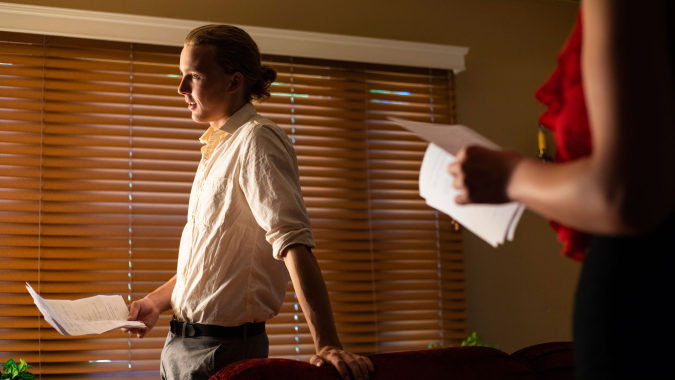
By Noah Smith '20
Since 1888, when the first full-length motion-picture was created, the influence and importance of film have undergone significant change. Film can encourage ideas and social commentary within society. It allows us to connect and share experiences. But how? How do you tell a story on-screen? How do these successional frames of images resonate with us so profoundly? In Colorado College's Summer Session course Basic Filmmaking, students are taught the fundamentals of filmmaking - planning, shooting, and editing - to bridge the gap between execution and emotion.
Filmmaker Meredith Mantik '11 is the professor for the course. She believes film is important for young adults to study based on an idea of responsibility and intentionality.
"It's being treated as a new form of literature, and I think it's an essential skill for younger people to learn right now," she says. "Filmmakers have a big responsibility in being intentional, so when they make films, they know what message they are sending out. What makes CC special is that we're able to examine the philosophy of film more deeply and how this philosophy makes film powerful."
In the class in Cornerstone Arts Center, groups of students crowd around computer screens, editing and discussing their current projects with one another. They experiment with film through a variety of short projects that culminate in a final public screening. The projects are collaborative and hands-on, like filmmaking itself. "Since working with people is such an important part of filmmaking, it is great that we have such a small class. It is like a little community, and the collaboration we're able to get from that is imperative to the course," says Mantik.
Through numerous workshops, the students can work with one another throughout the entire filmmaking process, with additional guidance from Mantik. However, the computer lab only accounts for half of the filmmaking process. The other half requires students to go out and utilize their surrounding environment for their films. Whether it be an outdoor scene needing a forest setting or an indoor scene requiring an old, Victorian interior, all can be found within walking distance of campus. At CC, on a summer day, there is chance one might spot a student lugging film equipment to their next scene location.
The subject matter for the projects, chosen by the students, is diverse, leading to a unique depiction of perspectives. One of the films Ana DiPietro '22 created focused on a semi-biographical story "about OCD and how it affects your everyday life." Madeline Stoces, a pre-college student, describes her film as, "a sort of film noir, set in the 1940s, about a woman who is unsatisfied with her marriage. She begins plotting his murder after she gets ideas from listening to a murder case in court."
Creativity and originality are highly encouraged, which can be a challenge, especially with additional material to study; however, the students appreciate the demanding routine. "The amount of material we've been able to cover has been incredible, even though it has also been brutal at times. I've learned so much. I'm even considering a film major because of it," says DiPietro. She says that her interest in film began with her family; "both of my parents are in the film industry, so I wanted to see how the process works. I also wanted to see how much effort goes into making a film and how the people who produce them make it appear effortless."
While some students had some prior interest in filmmaking, others are discovering an affinity for it during the course. "I am enjoying being behind the camera and planning out each shot. One thing I've found that I really enjoy is working with lighting; it turns out I'm not bad at it either," says Stoces.
In addition to the merger of pre-college and current CC students, the course's instructor being a graduate only adds to the fun. Mantik notes, "I understand the Block Plan well, so that extra experience has been beneficial. The small class size and ability to take substantial time with each student is also such an advantage. The course has changed quite a bit since I was here and with all the new equipment that the school can offer now, it's a great opportunity for the students." She goes further saying, "Film and Media wasn't even a major until a year or two after I graduated, so it's been great to see how the department has grown and transformed alongside the Cornerstone Arts Center itself. There is a new film garage, a new sound mixing station, a new green screen, and a multitude of new filming equipment. Plus, the computers are all equipped with the latest filmmaking software, and the students are provided with tech support every day. These resources were starting to blossom when I graduated, so it's thrilling to see them reach their full potential today."





